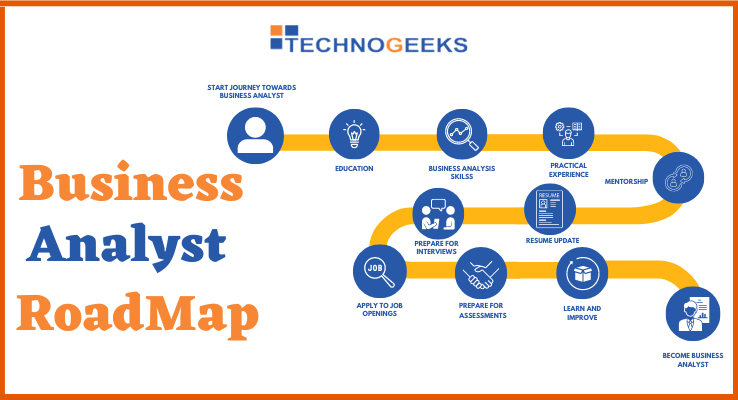Table of Contents
ToggleBusiness Analyst Roadmap: Steps to become a successful Business Analyst
Business analysts are vital to the success of organizations as they bridge the gap between business needs and technical requirements. They play a crucial role in understanding business objectives and ensuring projects are completed efficiently and within budget.
A business analyst roadmap is a valuable guide that outlines the path to becoming a successful business analyst. It helps individuals identify the necessary skills, knowledge, and certifications to pursue, as well as the steps to take for career advancement. By following this roadmap, aspiring business analysts can navigate their way towards a rewarding and impactful career.
From 2020 to 2030, the BLS (Bureau of Labor Statistics) predicts an 11% increase in demand for business analysts. This is way faster than average! Analysts are needed in many fields, giving you a lot of possibilities.
Business analysts also earn good salaries. In 2021, the average annual salary for business analysts was $93,750. Top earners made over $129,540. This means that working as a business analyst can provide financial stability and room for growth.
You need the right schooling and skills to do well as a business analyst. This piece will show you the training, skills, and real steps you can take to become a great business analyst. Let’s dive into the Business Analyst roadmap!
What is an Analyst?
Analysts are professionals who examine data, information, or systems to get insights and make recommendations. They specialize in different areas like finance, market, business, systems or data analysis.
Analysts gather and analyze data, research trends, and create reports. They use tools and techniques to understand data and help with decision-making.
Being an analyst needs critical thinking, problem-solving, and knowledge. They give valuable insights to organizations, help solve complex problems, and make data-based decisions.
Business Analyst Definition
A business analyst helps connect business needs with IT solutions. They analyze processes and propose improvements to enhance efficiency. They work with stakeholders and use tools to gather requirements and communicate with technical teams.
Bachelor’s degrees in business administration or computer science are typical qualifications in India. A master’s in business administration with a focus on business analysis is beneficial. Certifications and professional development programs can enhance skills. Practical experience and a strong skill set are important for success as a business analyst.
Why Business Analyst?
Business analysts bridge the gap between businesses and IT. They figure out how to fix & get things done. Different fields may make use of their abilities. Because of their efforts, companies thrive. They are always eager to learn more and are good team players. Various job paths are open to them. Business analysts thrive on challenges and contribute significantly to company development.
Business Analyst Description
A business analyst is a person who works to improve business processes, systems, and strategies by finding problems, analyzing needs, and suggesting good answers. They mediate between business stakeholders and IT teams to improve two-way communication and teamwork.
Roles and responsibilities of a business analyst
Here is a table of roles and responsibilities of a business analyst.
Role | Responsibility |
Requirements gathering | Gather and document the requirements of the business users. Understanding the business needs, identifying the problems that need to be solved, and defining the desired outcomes. |
Requirements analysis | Analyze the requirements to identify gaps, inconsistencies, and ambiguities. Validating the requirements with the business users and ensuring that they are complete, feasible, and testable. |
Requirements documentation | Document the requirements in a clear and concise way that can be understood by all stakeholders. Creating use cases, functional specifications, and non-functional requirements. |
Requirements management | Track the requirements throughout the project lifecycle. Ensuring that the requirements are kept up-to-date, communicating the requirements to the development team, and resolving any conflicts. |
Business analysis | Conduct business analysis to identify and solve business problems. Understanding the business processes, identifying the root causes of problems, and recommending solutions. |
Project management | Manage projects from start to finish. Planning, scheduling, budgeting, and communicating with stakeholders. |
Communication | Communicate effectively with a variety of stakeholders, including business users, technical staff, and project managers. This includes providing clear and concise updates, resolving any conflicts, and building relationships. |
Problem solving | Identify and solve problems. Using data and analysis to identify the root causes of problems, and recommending solutions. |
Decision making | Make decisions based on data and analysis. |
Business Analyst Roadmap
Step 1: Acquire Relevant Education or Certification
Get a degree in business, computer science, or a similar area. Consider pursuing professional certifications in business analysis to establish a strong foundation.
Step 2: Build Business Analysis Skills
Develop essential skills such as analytical thinking, communication, requirements analysis, process modeling, and data analysis. Seek practical experience through internships, projects, or volunteer work.
Step 3: Gain Practical Experience
Work on real-world business analysis projects through internships, part-time jobs, or collaborative projects. Practical experience deepens your understanding of business analysis processes and methodologies.
Step 4: Network and Seek Mentorship
Connect with professionals in the field by attending industry events and joining relevant professional associations or online communities. Seek mentorship to gain valuable guidance and access job opportunities.
Step 5: Tailor Your Resume and Cover Letter
Customize your resume and cover letter to highlight your relevant skills, education, certifications, and practical experience. Emphasize your achievements and the value you can bring as a business analyst.
Step 6: Prepare for Interviews
Familiarize yourself with common business analysis interview questions. Be ready to discuss your experience, problem solving abilities, and how you’ve contributed to successful projects.
Step 7: Apply to Job Openings
Search for business analyst job openings on job boards, company websites, and through professional networks. Tailor your application materials for each position, showcasing how your skills align with the job requirements.
Step 8: Prepare for Case Studies or Assessments
Some employers may require candidates to complete case studies or assessments to evaluate their business analysis skills. Familiarize yourself with common case study formats and practice solving business analysis problems.
Step 9: Continuously Learn and Improve
Stay updated with industry trends, emerging technologies, and best practices in business analysis. Seek opportunities for continuous learning and professional development to enhance your skills and stay competitive in the job market.
Business Analyst Scope in India
In 2023, business analysts in India have excellent job prospects. As companies adopt digital changes and rely more on data, there is a high demand for professionals who can analyze complex business needs and provide useful insights.
This demand is further boosted by the rise of startups, the growth of the IT industry, and government initiatives like “Digital India” and “Make in India.” With many opportunities across different sectors, business analysts can thrive by using their skills in data analysis, process improvement, and innovation.
Business Analyst Skills
Let’s see some of the skills needed for a business analyst:
- Communication and interpersonal skills
- Analytical and critical thinking skills
- Problem-solving skills
- Decision-making skills
- Technical skills
- Business knowledge
- Soft skills
Here are some additional skills that can be helpful for business analysts:
- Negotiation skills
- Documentation skills
- Presentation skills
- Leadership skills
Developing and honing these skills through education, practical experience, and continuous learning will significantly contribute to success as a business analyst.
Business Analyst Meaning in Hindi
The meaning of “business analyst” in Hindi is “व्यापार विश्लेषक” (Vyapar Vishleshak). This term refers to the role of a professional who analyzes business processes, gathers requirements, and proposes solutions to enhance business operations.
Business Analyst Department
Business analysts can work in different departments within organizations. They often work with the IT department to understand technical capabilities and gather system requirements. Some may be part of the Project Management Office (PMO) and help with project planning and execution. Others may work in business strategy or operations departments, analyzing trends and improving processes. Collaboration with stakeholders is crucial, regardless of the department.
Conclusion
In conclusion, creating a business analyst roadmap is crucial for achieving success in this field. By identifying skill gaps, pursuing relevant certifications, networking with peers, and tracking progress, you can ensure steady growth and stay on course towards your career goals.
Embrace opportunities for learning and adaptation as you navigate the dynamic business landscape. With determination and the right roadmap, you can confidently embark on a fulfilling journey as a successful business analyst. Best of luck on your path to success!















